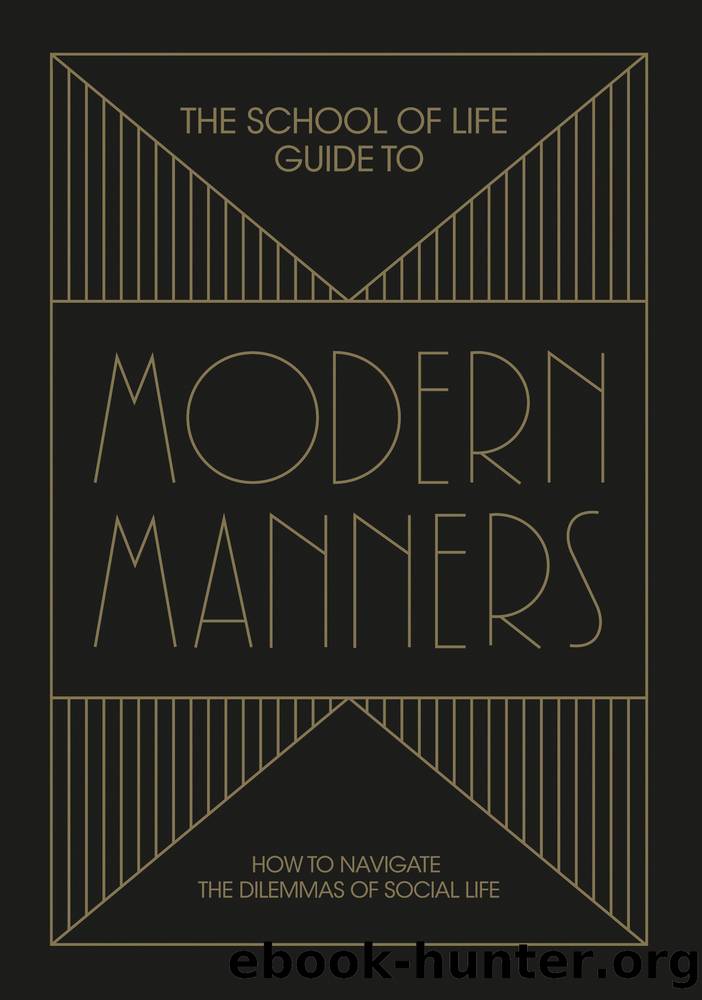The School of Life Guide to Modern Manners by The School of Life

Author:The School of Life
Language: eng
Format: epub
Publisher: The School of Life
12
HOW TO BECOME
SOMEONE PEOPLE
WILL CONFIDE IN
It is a mark of character to be thought of as someone that others can safely confide in; there is a high degree of empathy, generosity and open-mindedness implied in being the person that friends instinctively turn to when everything has gone dark.
But we may come to realise that, despite our best intentions, often others do not quite see us in this way. If we ask them directly what the matter is, they try to look cheerful and insist that everything is fine. We know it canât be, but nor do they seem inclined to open up to us. We end up lonely and a little helpless.
There are plenty of good reasons why people tend to show extreme care before opening up. A confidant may turn out to be patronising, alarmist, sentimental, panic-inducing or moralistic. The dangers of humiliation can be acute. To dare to confide, we need a strong feeling that our companion is going to be unreservedly understanding, gentle and kindly. But even if we feel ready to be all these things, how do we signal our capacities properly to others?
The almost touchingly obvious method is via direct assertion. âDonât worry, I wonât judge,â or simply, âYou can tell me, Iâm very understanding.â But kind though such statements may be, they donât generally help because they donât touch the core fear that â whatever we say â we may still turn out to be disturbed by, or hostile to, the details of actual revelations.
The more skilled approach requires a greater degree of courage on our part. It involves regularly admitting to something difficult and troubling and rather shameful about ourselves. Itâs by letting others know something of our own vulnerabilities that we free them up to share some of the things they are terrified of admitting in their lives. Our revelation proves far better than a headline statement that we are reliable because we know from the inside what itâs like to carry a dreadful secret and to feel frightened of another personâs reaction to it. Weâre demonstrating a crucial idea: that we wonât turn on them because weâve trusted them not to turn on us.
The process of building up trust often functions in an incremental way: we reveal a small and not too awful fact about ourselves, and the other then starts to share a little of whatâs going on for them. From there, we take a bolder step of admitting to something more significantly awkward: something we know could be seen as really not very acceptable. Weâre inviting the other to follow us in turn and to feel secure in opening their hearts yet wider.
The underlying idea is that in order to demonstrate our position as an empathetic receiver of confidences, we have to show our broken and flawed sides: weâve failed, so another can tell us of their failure; weâve been hurt, so they can admit to being hurt; weâve done, and admitted weâve done, very stupid things so weâre not going to turn against those who have also been at points very silly.
Download
This site does not store any files on its server. We only index and link to content provided by other sites. Please contact the content providers to delete copyright contents if any and email us, we'll remove relevant links or contents immediately.
Rewire Your Anxious Brain by Catherine M. Pittman(17620)
Talking to Strangers by Malcolm Gladwell(11956)
The Art of Thinking Clearly by Rolf Dobelli(8901)
Mindhunter: Inside the FBI's Elite Serial Crime Unit by John E. Douglas & Mark Olshaker(7875)
Becoming Supernatural by Dr. Joe Dispenza(7143)
Change Your Questions, Change Your Life by Marilee Adams(6687)
The Road Less Traveled by M. Scott Peck(6672)
Nudge - Improving Decisions about Health, Wealth, and Happiness by Thaler Sunstein(6667)
The Lost Art of Listening by Michael P. Nichols(6514)
Enlightenment Now: The Case for Reason, Science, Humanism, and Progress by Steven Pinker(6435)
Win Bigly by Scott Adams(6342)
Mastermind: How to Think Like Sherlock Holmes by Maria Konnikova(6278)
The Way of Zen by Alan W. Watts(5829)
Daring Greatly by Brene Brown(5679)
Big Magic: Creative Living Beyond Fear by Elizabeth Gilbert(4763)
Grit by Angela Duckworth(4760)
Men In Love by Nancy Friday(4367)
Flow by Mihaly Csikszentmihalyi(4079)
The Four Tendencies by Gretchen Rubin(4044)
